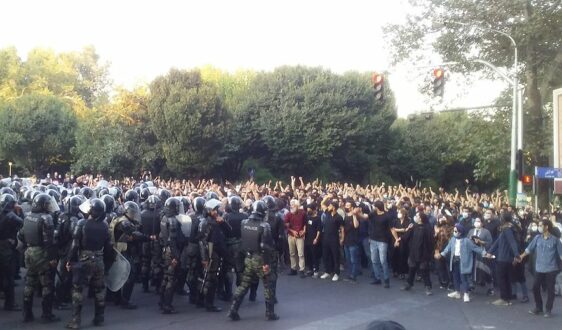Iranwire – Ivan Marovic, one of the leaders of the protest movement in Serbia that toppled Yugoslavian strongman Slobodan Milošević in 2000, has told IranWire that he is optimistic about the prospect of democratic change in Iran in light of this month’s protests.

In an interview with IranWire’s founder Maziar Bahari, Marovic said he had been following political developments in the country – and successive waves of popular protests like those ongoing in Iran at the moment since the 2009 Green Movement.
“We are all really inspired by what we see in Iran,” he said, “and the courage, determination and persistence is something we can all learn from.
“It’s a difficult struggle. Most movements take a very long time to create meaningful change, especially in entrenched regimes which are not willing to listen. So in a sense, that persistence needs to be even greater.”
Marovic was a student organizer and one of the leaders of Otpor, a nonviolent resistance group in Serbia. Otpor began life as a civil protest movement in 1998 and went on to garner some 70,000 members.
Otpor’s tactics including organizing mass demonstrations against dictatorial rule in Serbia, blockades, occupying government buildings, media activities, and other public expressions of dissent.
The group published a “Declaration on the Future of Serbia” and went on to agitate for a free and fair election overseen by international bodies that eventually pushed Milošević out of office.
Marovic told IranWire that he remained convinced a peaceful mass mobilization was the best way to ensure success in bringing about change.
“When we go into a conflict with a dictator,” he said, “they’re much better-equipped, better-skilled, and don’t have any scruples at all. So it doesn’t matter if we’re violent or nonviolent.”
At the same time, he said, “If you look at the overall trend, it shows that nonviolent movements have been twice as successful as violent movements, at least in the 20th and the early 21st centuries.”
Marovic said that instead of trying to fight the regime on its own violent terms, Iranian civilians should focus on making the movement bigger and ensuring superior numbers. The more people physically present in the street, the harder it will be for agents of the regime to break them or their resolve.
Simultaneously, he told IranWire, there were other avenues citizens could use to disable the current regime, such as strikes, boycotts, non-cooperation with the government and refusal to pay taxes. Some of these have already been observed happening in Iran in the past week.
“When we go to the street, they can beat us and arrest us,” he said. “But when we as citizens stop fulfilling our duties and obligations, the regime has many difficulties to deal with.”
In addition to this, Marovic said, Iranians could lay the groundwork for a future transition by bolstering civil society and starting to create new institutions that could one day take the place of government.
“For instance, neighborhood committees,” he said. “There are cases in different countries where they were going so far as [to create] parallel schools, parallel media, parallel institutions. Then, it didn’t really matter what the regime was trying to do, because people started building up their own power. That made it difficult even for crackdowns or any kind of mass arrest to stop that shifting of the power balance.”
Marovic added that in Iran and elsewhere in the world today, he finally saw cause for optimism after a 10- to 15-year trend of decline of civic freedoms in many countries. “There been things happening around the world lately,” he said, “especially this year. We have reached a point where the tide is turning.
“We can see with Ukraine how badly it’s going for Putin. We are seeing people in China demanding that they don’t pay mortgages for apartments that were never built for them, where the money was just stolen by the regime. And we see it in Iran with these protests. I am very, very optimistic that the resurgence of authoritarianism we have seen is about to end.”
 Shabtabnews In this dark night, I have lost my way – Arise from a corner, oh you the star of guidance.
Shabtabnews In this dark night, I have lost my way – Arise from a corner, oh you the star of guidance.



